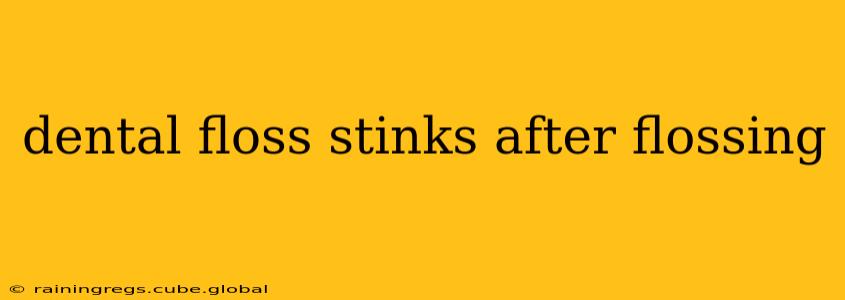Flossing is crucial for oral hygiene, but sometimes you're left with a less-than-pleasant surprise: bad breath after flossing. This isn't uncommon, and it's usually easily addressed. Let's explore the reasons why your breath might smell after flossing and how to combat it.
Why Does My Breath Smell After Flossing?
This often stems from disturbing bacteria and food particles lodged between your teeth. Flossing dislodges these, momentarily releasing their odor. Think of it like this: you're cleaning out a hidden area, and the initial cleanup might release a smell before things become fresh. However, persistent bad breath after flossing could signal other issues.
What Causes Bad Breath After Flossing?
Several factors contribute to post-flossing bad breath. Let's delve into the most common culprits:
1. Bacteria and Food Debris:
This is the most common cause. Food particles trapped between your teeth decompose, creating volatile sulfur compounds (VSCs) responsible for that unpleasant odor. Flossing removes these particles, but the initial release of these compounds can lead to temporary bad breath.
2. Gum Disease (Gingivitis or Periodontitis):
If you have gum disease, flossing can expose infected areas, leading to a more pronounced bad breath. Inflamed gums harbor bacteria, and flossing can disturb them, releasing their byproducts. This isn't just a temporary smell; it's a sign you need professional dental care.
3. Dry Mouth (Xerostomia):
Saliva plays a vital role in neutralizing acids and washing away food particles. Dry mouth reduces saliva production, allowing bacteria to thrive and potentially worsen the smell after flossing.
4. Poor Flossing Technique:
Improper flossing might not effectively remove all food particles, leaving some behind to fester and cause bad breath. Ensure you're using the correct technique; your dentist can demonstrate the best method for you.
5. Underlying Medical Conditions:
In some cases, bad breath can be a symptom of underlying medical conditions, such as diabetes or kidney disease. If you experience persistent bad breath despite good oral hygiene, consult your doctor.
How Can I Prevent Bad Breath After Flossing?
Here's how to keep your breath fresh and avoid that post-flossing smell:
- Proper Flossing Technique: Use gentle, C-shaped motions to guide the floss between your teeth, hugging the tooth's surface.
- Rinse Thoroughly: After flossing, rinse your mouth with water or mouthwash to remove dislodged particles and neutralize odors.
- Brush Your Teeth: Brushing before and after flossing completes the cleaning process and helps eliminate bacteria.
- Stay Hydrated: Drinking plenty of water helps stimulate saliva production, combating dry mouth.
- Regular Dental Checkups: Regular visits to your dentist for cleanings and checkups are crucial for preventing and treating gum disease.
- Consider a Tongue Scraper: Bacteria can accumulate on your tongue, contributing to bad breath. A tongue scraper helps remove these bacteria.
- Dietary Changes: Limit the consumption of odor-causing foods, such as garlic and onions.
Does Using Mouthwash After Flossing Help?
Yes, using mouthwash after flossing can significantly help. Therapeutic mouthwashes containing chlorhexidine or essential oils can kill bacteria and leave your breath feeling fresher. However, it's important to remember that mouthwash is a supplement to brushing and flossing, not a replacement.
Why Does My Breath Still Smell After Brushing and Flossing?
If your breath still smells after brushing and flossing, it could indicate a more serious underlying issue such as gum disease or a medical condition. It's crucial to consult your dentist or doctor for a proper diagnosis and treatment.
By following these tips and addressing any underlying issues, you can enjoy the benefits of flossing without the unpleasant side effect of bad breath. Remember, consistent oral hygiene is key to a healthy and fresh-smelling mouth.
